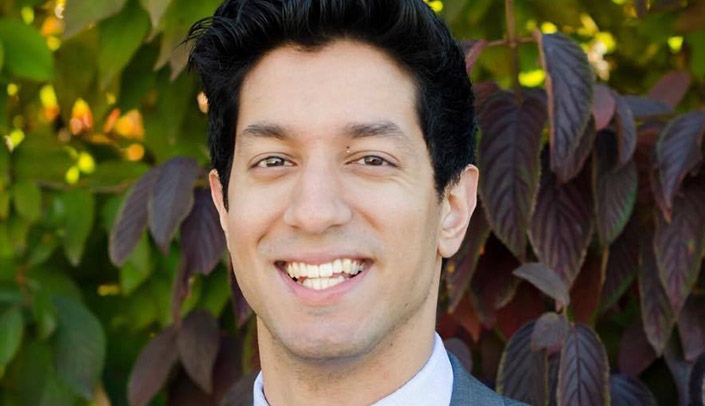UNMC medical student Rohan Khazanchi is the Nebraska Medical Association’s Student Advocate of the Year.
The award recognizes a student who has played a crucial role in enhancing the NMA’s public policy priorities.
Khazanchi has been working with NMA since he was a first-year medical student, getting involved through UNMC’s chapter of the American Medical Association (AMA).
In the past year, he has worked closely with the NMA as the community outreach coordinator for UNMC COVID Relief, or CoRe, coordinating with NMA, the Metro Omaha Medical Society, and several local and national partners to bring personal protective equipment to Nebraska, sew thousands of cloth masks, and help distribute these resources around the state.
“Our UNMC CoRe leadership team was able to set up a pipeline that brought in 60,000-plus masks, face shields, and other units of PPE. We also organized hundreds of community members to sew 45,000 adult and child cloth masks which were paired with multi-language health information for vulnerable communities in Omaha,” he said. “It was a truly collaborative effort, with strong leadership from UNMC students.”
The NMA also has supported Khazanchi and other medical students getting involved in state and national advocacy. Khazanchi has served for two years as a delegate from the Medical Student Section to the AMA House of Delegates. This year, Khazanchi was selected to serve on the Council on Medical Education, a group that authors reports and advises the AMA House of Delegates on issues across the medical education continuum.
His work this year included co-authoring a pair of op-eds — on the need for ethnic/racial data on COVID-19 in Nebraska and on safely reopening schools — with UNMC Division of Infectious Diseases faculty members for the Omaha World-Herald.
“The first called on the state to publicly report COVID-19 cases and deaths by race and ethnicity, so that public health experts could better understand and mitigate the disproportionate impacts of the pandemic on communities of color,” he said. “The second was about safely reopening schools, advocating that our school districts and state encourage public health best practices including a mask mandate.”
Both are personal issues for Khazanchi.
“I’ve been interested in health equity since before starting medical school,” he said. “Learning to translate this interest into making the science relevant for policy makers has been an important personal transition throughout medical school.
“My parents are both public educators, so school reopening was a dinner table conversation our family was having every night just like many other families in Omaha — ‘How schools are going to reopen? What’s going to happen when students come back to the classroom? How can we take care of students with challenging social and personal circumstances?’
“Even now, I’m hearing from my mom about the planned Omaha Public Schools transition from virtual to in-person learning – so, the challenges are not as abstract for me, they are pretty concrete and directly inform my perspective as an advocate.”
Physicians, in Khazanchi’s view, have a duty to advocate on public health issues.
“Doctors have been among the most trusted members of American society for generations. Understanding that the public looks to us for expertise on matters of health is critical,” he said. “When we speak up in a policy space, policy makers listen and trust us.
“Part of being a physician is doing the interpersonal, one-on-one work of patient care. But the other important part of what I consider to be a professional responsibility is using our privilege to amplify the voices of our most vulnerable patients.
“For me, it all comes back to health equity. We see in our clinics, hospitals, and research that marginalized patient populations consistently bear the brunt of adverse health outcomes. When we recognize that there are clear inequities in who’s being impacted by the pandemic, by chronic health issues and disease risk factors, by structural racism and social inequality, then I view it as a personal responsibility to speak up.
“Modern scientific consensus tells us that medical care only accounts for 10-20% of the contributors that determine health outcomes, and the other 80-90% come from “social determinants of health,” which are directly impacted by health and social policies. We also know that the reason race and health outcomes are so tightly correlated is largely because of racism — historical and present, interpersonal and institutional –which perpetuates differential access to the resources and opportunities of modern American society. We need to constantly ask ourselves: what actions can we take on a clinic, health system and policy level to help ensure all of our community members have the opportunity to lead a healthy, happy life?”
Khazanchi said he wouldn’t have received the NMA honor without support from mentors within the NMA and AMA, including UNMC faculty members Kelly Caverzagie, MD, Jordan Warchol, MD, Alëna Balasonova, MD, and Sean Figy, MD.
He also credited his peers.
“Olivia Sonderman and Laura Newton were my co-conspirators in creating the Nebraska Health Policy Network in 2018 — and Olivia very deservingly won this award last year,” he said. “Keely Reidelberger, Natasha Hongsermeier-Graves, Taylor Kratochvil and Hannah Tandon have similarly taken up critical leadership roles within our AMA chapter and UNMC CoRe.
“We all do this work together; there’s no individual work when it comes to advocacy.”

Congratulations to Rohan on this well-deserved award!
Congratulations to Rohan, well deserved! You are an example to your peers and all of us at UNMC of a great advocate for social justice.